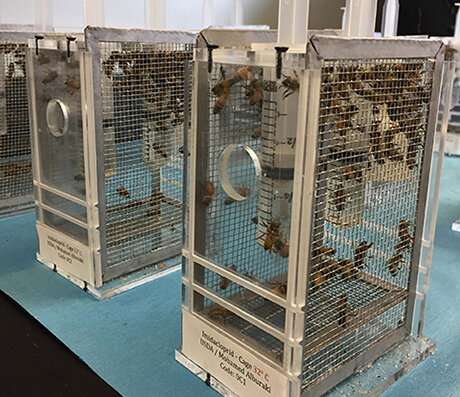Winter honey bees show resistance to a common insecticide

Winter honey bees, compared to newly emerged summer bees, have a better ability to withstand the harmful effects of a widely-used insecticide in pest management, according to a recent study published in Apidologie.
United States Department of Agriculture (USDA), Agricultural Research Service (ARS) researchers from the Bee Research Laboratory in Beltsville, Maryland, found winter honey bees' consumption of a nearly lethal, imidacloprid-laced syrup did not affect their survival during the study.
Imidacloprid is an insecticide made to mimic nicotine and is toxic to insects. This powerful insecticide is widely used in agriculture for pest management control. Honey bees are likely to encounter imidacloprid while foraging in the field or through contaminated hive products.
"Although imidacloprid toxicity to honey bees is an important concern for beekeepers, our results provide good news," said Miguel Corona and Mohamed Alburaki, researchers at the ARS Bee Research Laboratory. "Our research shows that winter honey bees have unrecognized physiological mechanisms to counteract the effects of insecticides."
The study assessed differences in diet behaviors for summer and winter honey bees in a controlled laboratory setting. Researchers provided sublethal doses of the imidacloprid-laced syrup to bees as necessary. Winter bees showed a preference to consuming imidacloprid-laced syrup over untreated sugar syrup while summer honey bees made the safe choice and avoided consuming the laced syrup each time.
According to Corona, it is important to study the differences of summer and winter honey bees' diets. Honey bee colonies survive extreme seasonal differences in temperature and forage by producing two seasonal phenotypes of workers: summer and winter bees. These seasonal phenotypes differ significantly in their psychological characteristics as well as their susceptibility to disease and ability to handle poisonous substances.
"Winter bees and summer bees undergo physiological changes to cope with drastic seasonal changes in temperature and the availability of nutritional resources," said Corona and Alburaki. "Our results suggest that long-lived winter bees are especially well-adapted to tolerate higher levels of chemical stressors."
Corona said that although the study's results show that winter bees could tolerate more intoxication by imidacloprid, they are still susceptible to higher concentrations of this insecticide in field settings.Native Asian honeybees have higher toxin tolerance than introduced bees
More information: Mohamed Alburaki et al, Influence of honey bee seasonal phenotype and emerging conditions on diet behavior and susceptibility to imidacloprid, Apidologie (2022). DOI: 10.1007/s13592-022-00922-9
No comments:
Post a Comment